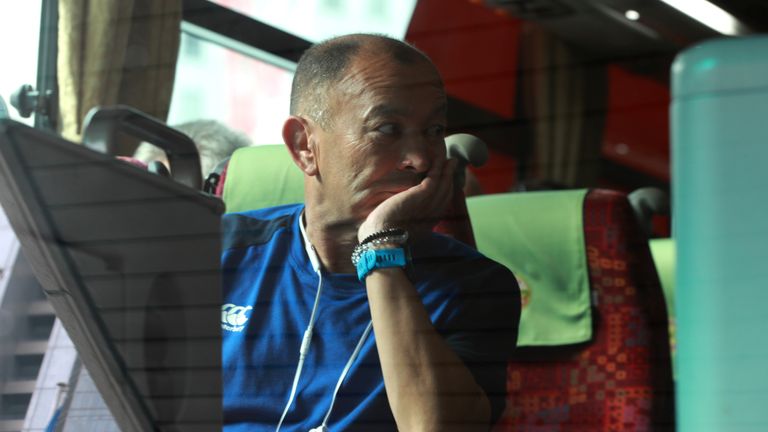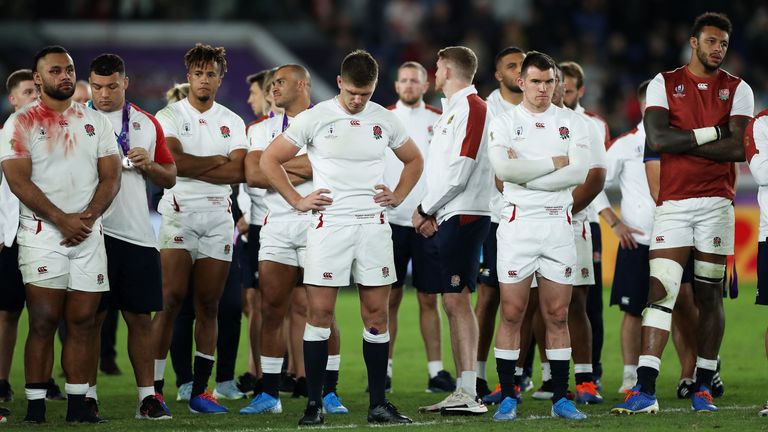World Cup final: Scrum savagery; a nightmare start - Key talking points as South Africa beat England 32-12
Springboks clinch third ever World Cup (1995, 2007, 2019); England lose third final (1991, 2007, 2019)

Monday 16 December 2019 15:21, UK
We look at the major talking points after South Africa's brutally clinical 32-12 Rugby World Cup final victory over England in Yokohama.
Makazole Mapimpi and Cheslin Kolbe tries, plus 22 points via the boot of Handre Pollard, saw a monstrously-physical South Africa seal a third Rugby World Cup triumph against England.
Here's what stood out after a historic Saturday in Japan...
Pivotal scrummaging & relentless power
The immediate takeaway from this final in so many respects, was the scrum and South Africa's utter domination of that facet.
So often trivialised and bemoaned in modern day rugby, Saturday's proceedings were a ruthless reminder of the scrum's critical importance to any Test match.
Trending
- Usyk denies Fury in intense world championship rematch
- Highlights: Usyk overcomes Fury in epic heavyweight rematch
- Fury rages: I was robbed... Usyk got a Christmas gift!
- Papers: Arsenal, Man City and Bayern in three-way battle for Olmo
- 'He got a Christmas gift!' | Fury left fuming in post-fight press conference
- Big fight reaction: What next for Fury and Usyk after contentious call?
- 'Uncle Frank is blind!' | Usyk responds to Fury complaints
- Littler survives scare to threaten nine-darter and win Worlds opener
- 'I want my revenge!' Dubois storms ring to demand Usyk rematch
- Dubois storms ring to demand undisputed Usyk 'revenge' fight
England lost starting tighthead Kyle Sinckler to a head injury just two minutes in, as he was rendered unconscious attempting to make a tackle.
Notwithstanding the fact Sinckler is the anchor of the England scrum, his loss was a monumental setback to their carrying and offloading game too.
Dan Cole arrived off the bench and was pressed into playing some 77 minutes of a World Cup final at the age of 32, against two looseheads widely regarded to be among the best in the world: Tendai Mtawarira and Steven Kitshoff.
The first scrum of the final occurred in the immediate aftermath of Cole's arrival, and the Boks went to town as a secondary shove gained in power and forced referee Jerome Garces to raise his arm. It would be far from the last time.
Further scrum penalties arrived after 17, 26 and 40 minutes - the latter two allowing Pollard to kick the Boks into a six-point half-time lead.
On 44 minutes, props Kitshoff and Vincent Koch arrived and fashioned the most dominant scrum effort of the Test, annihilating their English counterparts. Pollard kicked three more points to extend the lead to nine, and in an arm-wrestle type contest, such a margin was always likely to prove significant.
Four minutes later, another scrum penalty saw the Boks exit their 22. Psychologically, it was immensely taxing on the English pack, and there was no way back.
It's difficult to recall an English scrum being so comprehensively outplayed before - and it happened on the biggest stage of all.
The start of nightmares
Prior to the Test, England's bus arrived 25 minutes late to the stadium. Their players made a similarly meagre start.
To condense matters, England's start to this game was as poor as their beginning to semi-final victory over New Zealand was brilliant.
Courtney Lawes was penalised for a penalty inside the first minute after getting trapped on the wrong side of a ruck, Sinckler had to depart injured and the side were rattled and making unwise decisions.
Owen Farrell overthrew a pass in-goal as they attempted to play out from behind their own try-line - a remarkably dangerous ploy - before Billy Vunipola passed to nobody in his own 22 off the base of a scrum.
England's errors were of a scale and frequency unimaginable in the previous seven weeks.
Elsewhere, scrum-half Ben Youngs threw a pass straight off the pitch, a lineout was lost as Eben Etzebeth forced a Lawes knock on, a restart sailed over of the grasp of Maro Itoje and was knocked on by Tom Curry - a spillage which preceded another scrum penalty - and George Ford sent a kick out on the full.
And that was just the first 27 minutes. It was an incessant tidal wave of negativity and faux pas, the like of which South Africa latched onto and tore into.
England ended the half as they began it, Elliot Daly knocking on a bouncing ball in his own half, and the pack conceding a penalty at the resultant scrum, going in 12-6 behind and several miles off the pace.
Jones attempted to change things, bringing on George Kruis for Lawes and Joe Marler for Mako Vunipola, but the mistakes kept coming: Ford's first tactical kick in the half far too long, Jamie George throwing a pass straight out minutes later.
Another scrum penalty concession and maul turnover fed into England's frustration and, in turn, took the form of oxygen for South Africa's revved up charges.
Anthony Watson gave away a needless penalty for nudging Mapimpi off the ball, Youngs elected not to find touch with a box-kick before the Springboks ripped back for the opener, while Henry Slade knocked on and Farrell was stepped by Kolbe for the second try.
Pitch-perfect against New Zealand a week ago in the greatest England performance of the professional era, not a lot more could have gone wrong for them in the one that really, truly mattered.
As Wales coach Warren Gatland pondered in the lead-up, several of the standout semi-final performers from World Cups gone-by have failed to replicate efforts to the same degree in the final.
England did in fact play their Rugby World Cup final a week early it seems.
All on the day
Despite a conclusive margin of difference both on the scoreboard and in pretty much all meaningful aspects of play, few would argue the considerable difference in difficulty the respective sides faced in reaching this stage.
Having beaten Argentina, Australia and New Zealand to reach the final, victory over the Boks would likely have heralded an England triumph as the most impressive run in history.
By contrast, South Africa failed to top their pool after being soundly beaten by the All Blacks in Pool B, and made the quarter-finals after victories over Italy, Canada and Namibia.
There, instead of facing Ireland as most expected the runner-up of Pool B would, they came up against Japan. Fantastic hosts, but playing their first ever World Cup knockout tie and clearly lacking the desired power to go further.
Thereafter, South Africa faced a Wales side beset by injuries and who had been thoroughly outplayed a week previous by France in Oita, progressing almost entirely due to the reckless actions of Sebastien Vahaamahina.
The semi-final proved a rotten affair, with mis-placed kicking and very little rugby to the fore, but the Boks ground it out.
Underdogs for the final, South Africa played with a freedom and intensity which England couldn't contain.
As Rassie Erasmus stated in the post-match press conference, the concept of pressure in South Africa is vastly different to most. Pressure back home is not having a job and having to deal with the murder of a relative.
Rugby, in perspective, isn't pressure at all. And this Springbok squad played that way, while England seemed to play with the weight of expectancy on their shoulders.
Being paired in the same pool as New Zealand allowed South Africa to avoid them until the final - which, of course, they never made - while it also, in retrospect, placed them on the easier side of the draw.
Erasmus admitted as much in the aftermath, recognising that luck had played a major part until this point.
But this is tournament rugby and it comes down to one 80 minutes - it always will. It's all on the day, as this youthful England side had to learn the hard way in Japan.












